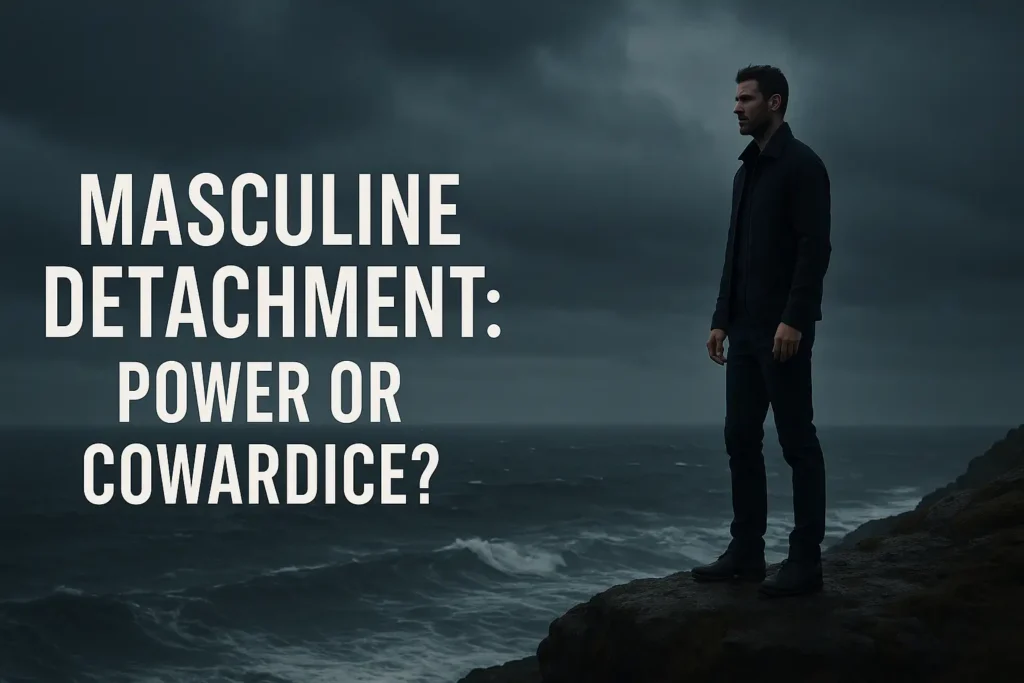
Table of Contents
Introduction
Detachment has become a buzzword in conversations about masculinity. Some men swear by it as the ultimate show of strength — the ability to walk away from anything or anyone without blinking. Others see it as cold, cowardly, and emotionally stunted.
So which is it? Power or cowardice?
The answer is both — depending on how you use it.
Here’s the truth: masculine detachment is not apathy. It’s not shutting down and pretending you don’t care. It’s not ignoring your emotions, ghosting women, or refusing to engage with life. That’s not detachment. That’s avoidance. And avoidance is weakness.
Real detachment is something different. It’s the ability to stay centered when emotions run high. It’s being able to walk into chaos and not lose your frame. It’s hearing criticism, rejection, or insult — and staying calm enough to respond with reason, not reactivity.
Think of it like this: detachment is the anchor that keeps a man steady when the storm hits. Without it, every wave of emotion knocks you off course. With it, you stay on track. That’s power.
But there’s a dark side. Some men use “detachment” as an excuse to run from responsibility. They call it strength when they’re really just afraid to care, afraid to commit, afraid to risk pain. They build walls so high that nobody can ever get close — and then call it “stoicism.” That’s not strength. That’s fear disguised as masculinity.
So yes — masculine detachment can be power. But it can also be cowardice. The difference lies in whether you’re using it to rise above or hide below.
This article will cut through the noise and show you what true masculine detachment looks like — and when it crosses the line into weakness.
What Masculine Detachment Really Is

Most men get detachment wrong. They confuse it with apathy. They think being detached means never caring, never feeling, never being vulnerable. They mistake numbness for strength. But that’s not detachment — that’s emotional shutdown.
True masculine detachment isn’t about running from your emotions. It’s about mastering them. It’s the ability to step back, zoom out, and not get swallowed by whatever you’re feeling in the moment.
A detached man still feels deeply. He still gets angry, still feels attraction, still experiences disappointment, joy, and even heartbreak. But the difference is this: he doesn’t let those emotions dictate his actions. He chooses his response instead of being enslaved by impulse.
This kind of detachment is rooted in control, not avoidance. It’s the calm in the middle of chaos. It’s the pause before the reaction. It’s being able to say, “I feel this — but I won’t be ruled by it.”
Here’s what masculine detachment is not:
- It’s not ghosting women because you’re afraid of intimacy.
- It’s not bottling up anger until it explodes.
- It’s not pretending rejection doesn’t hurt when you know it does.
Those are avoidance strategies. And avoidance is weakness.
Real detachment shows itself in subtle but powerful ways:
- A boss yells at you, and instead of snapping back or shrinking down, you calmly set boundaries.
- A woman pulls away, and instead of chasing or panicking, you stay grounded and let her go.
- Life throws setbacks at you, and instead of collapsing into self-pity, you refocus on what you can control.
Masculine detachment isn’t coldness — it’s composure. It’s not about caring less — it’s about caring smarter.
Because the strongest man isn’t the one who feels nothing. It’s the one who feels everything but remains unshaken.
The Power of Detachment

When practiced correctly, masculine detachment is one of the most powerful tools a man can develop. It gives you leverage in every area of life — relationships, business, and even your own mental health.
Freedom From Emotional Manipulation
The world is full of people who want to push your buttons. Women test men to see if they can hold their frame. Bosses use pressure to control employees. Society itself thrives on outrage, feeding you triggers to keep you distracted and reactive. A man without detachment gets played like a puppet. A man with detachment? He sees the strings — and cuts them.
Clarity in Chaos
Life doesn’t give warnings before the storm hits. You lose the job. The woman leaves. A loved one dies. The man without detachment gets consumed by panic and despair. But the detached man? He breathes. He steps back. He assesses the situation with clarity. Detachment creates space between what happens and how you respond — and in that space lies real power.
The Ability to Walk Away
This might be the sharpest edge of masculine detachment. When you’re truly grounded, you don’t cling to what disrespects you. You can walk away from a toxic job, a manipulative partner, or a fake friendship without hesitation. And because you can walk away, you’re harder to control, harder to exploit, harder to break.
Respect From Others
People can sense when you’re not ruled by emotions. It makes them trust you more. Men respect a man who stays steady under pressure. Women feel safer around a man who doesn’t lose himself in her storms. Detachment commands respect because it signals strength.
When Masculine Detachment Becomes Cowardice

Detachment can be powerful — but it can also be a mask. And too many men are hiding behind it.
On the surface, they look composed. They don’t get rattled, they don’t chase, they don’t flinch. But dig deeper and you find something else: fear. Fear of caring. Fear of rejection. Fear of pain.
That’s when detachment stops being strength and becomes cowardice.
Avoiding Instead of Engaging
There’s a difference between staying calm in the storm and refusing to step into the storm at all. Some men use detachment as an excuse to avoid responsibility. They call it “stoicism” when really it’s apathy. They don’t pursue ambition. They don’t risk vulnerability. They avoid challenges — and then brag about how “unbothered” they are. That’s not strength. That’s hiding.
Refusing to Connect
The cowardly version of detachment builds walls so high nobody can get in. No friendships go deep. No woman ever gets close. No mentor is ever allowed to challenge them. They tell themselves they’re “self-reliant,” but the truth is they’re terrified of being seen. A man who refuses connection under the guise of detachment isn’t strong — he’s just lonely.
The Illusion of Superiority
Some men wear detachment like armor to feel above others. They roll their eyes at people who care, who love, who fight for something bigger than themselves. They confuse cynicism with wisdom. But superiority is just another mask for insecurity. If your detachment makes you feel “better” than everyone else, you’re not detached — you’re fragile.
Detachment becomes cowardice when it’s used to escape instead of endure. When it protects you from discomfort instead of preparing you to face it. When it makes you smaller instead of stronger.
Because the truth is this: it takes more courage to care and risk pain than it does to wall yourself off.
The Balance Between Power and Cowardice

Masculine detachment sits on a knife’s edge. On one side, it’s power. On the other, it’s cowardice. The challenge for men today is learning to tell the difference — and staying firmly on the side of strength.
Detachment as Power
Detachment becomes power when it helps you stay composed under pressure. It’s when you face conflict without losing your frame. It’s when you choose principle over impulse. It’s when you can care deeply about someone or something — but not let that care turn into weakness.
A man with powerful detachment can be fully present in a relationship, but he won’t tolerate disrespect. He can pursue ambitious goals, but he won’t collapse when setbacks hit. He can grieve deeply, but he won’t be swallowed by despair. That’s power: caring without being controlled.
Detachment as Cowardice
On the flip side, detachment becomes cowardice when it’s used to avoid risk. A man tells himself he’s “above it” when in reality he’s just afraid to try. He says he doesn’t care because caring would mean exposure. He rejects commitment because commitment requires vulnerability.
This isn’t strength. It’s fear hiding under a mask of composure. And sooner or later, it reveals itself — through emptiness, loneliness, and regret.
Walking the Line
So how do you know where you stand? Simple: ask yourself whether your detachment is helping you rise above or keeping you from stepping in. If it makes you stronger, calmer, and more capable — it’s power. If it makes you smaller, colder, and disconnected — it’s cowardice.
The strongest men walk this line carefully. They detach not to avoid life, but to engage with it more fully. They don’t let emotions make them reckless — but they don’t fear them either. They embrace responsibility, connection, and risk, while refusing to be owned by any of it.
That’s the balance. That’s real masculine detachment.
How to Practice Healthy Masculine Detachment
Detachment isn’t something you fake. It’s something you build through habits, choices, and discipline. If you want to embody healthy masculine detachment, here’s how you start:
1. Control Your Inputs
You can’t expect to stay calm if you flood yourself with chaos every day. Endless scrolling, doom headlines, toxic people — they keep you reactive. Detachment starts by cutting off noise. Curate what enters your mind. The less junk you consume, the steadier you become.
2. Master the Pause
Healthy detachment shows itself in the gap between trigger and response. When something angers you, humiliates you, or tempts you — pause. Take the breath. Count to three. Step back mentally before you act. That tiny gap is the difference between being ruled by impulse and ruling yourself.
3. Practice Letting Go
Most men cling too tightly — to women, to jobs, to outcomes. Detachment means practicing release. If she disrespects you, let her walk. If the job drains you, be willing to move on. If the outcome slips, focus on the process. The more you practice letting go, the freer and stronger you become.
4. Build Anchors
Detachment isn’t about floating aimlessly. You need anchors — habits, routines, values — that keep you grounded. Morning training, journaling, brotherhood, spiritual practice. These anchors remind you who you are, even when the storm rages.
5. Engage Without Attachment
The highest level of masculine detachment is this: give fully without needing control. Love her, but don’t chase her validation. Work hard, but don’t tie your worth to results. Lead others, but don’t beg for their approval. You show up, you give your best — and then you release what’s beyond your control.
Healthy detachment isn’t about being cold. It’s about being clear. It’s the discipline of engaging with life fully while refusing to be enslaved by it. And when you practice it daily, you become the kind of man who can walk into chaos and remain unshaken.
Masculine Detachment in Brotherhood and Relationships
Detachment isn’t just a solo skill. It shows up in how you deal with other people — in your friendships, your brotherhood, and especially your relationships with women. And this is where men either rise to true strength or slide into cowardice.
Brotherhood: Iron Sharpening Iron
In a circle of strong men, healthy detachment gets tested. Your brothers will call you out, push your buttons, and hold you accountable. Without detachment, you get defensive or lash out. With detachment, you can absorb the feedback, strip away your ego, and grow. Brotherhood demands composure, and detachment is the tool that keeps you from folding when another man tells you the truth you don’t want to hear.
Friendships Without Clinging
Detachment also keeps your friendships clean. A man with no self-respect clings to people out of fear of being alone. But a detached man doesn’t need to cling. He values connection, but he doesn’t chain himself to it. If a friendship becomes toxic, he lets go. If a brother drifts, he wishes him well and keeps moving. That’s strength — connection without desperation.
Relationships With Women
This is where detachment gets its sharpest test. Women instinctively test men to see if they can keep their frame. The needy man fails — he chases, he begs, he folds under pressure. The detached man passes — he listens, he leads, and if she crosses the line, he walks.
Detachment doesn’t mean being distant or cold with a woman. It means being grounded enough to engage fully without losing yourself. It’s loving without becoming dependent. It’s committing without fear of leaving if respect disappears.
Detachment in relationships — with men or women — isn’t about walls. It’s about strength. It’s knowing you can connect deeply but never lose yourself in the process. That’s when detachment becomes power, not cowardice.
Conclusion
Masculine detachment is a double-edged sword. Wielded with discipline, it’s one of the greatest strengths a man can possess. Wielded with fear, it becomes one of the greatest weaknesses.
When it’s power, detachment anchors you in chaos. It keeps you calm under pressure, immune to manipulation, and free to walk away when respect is gone. It makes you steady, reliable, and trustworthy — a man who cannot be broken by every storm.
When it’s cowardice, detachment is just running in disguise. It’s hiding from risk, refusing to care, and masking fear as composure. It leaves men isolated, empty, and disconnected from life itself.
The difference lies in intention. Are you detaching to rise above — or to hide below? Are you choosing composure — or avoiding vulnerability? One path makes you stronger, the other makes you weaker.
True masculine detachment isn’t about caring less. It’s about caring smarter. It’s about engaging fully with people, work, and life, while refusing to be enslaved by any of it.
So ask yourself: does your detachment come from strength or fear? Because only one of those paths will make you the man you’re meant to be.
👉Want to reclaim your life?
Join My Newsletter The Honest Masculine weekly newsletter — and you’ll get instant access to my (The Masculine Comeback: A 7-Day Reset for Men Who Feel Lost). No fluff, no filters. Just raw truths about breakups, masculinity, fatherhood, and the quiet battles men face alone.
It’s for the man who’s done pretending.

If you like my content? Let me know by Buying me a coffee. Thanks 🙂



